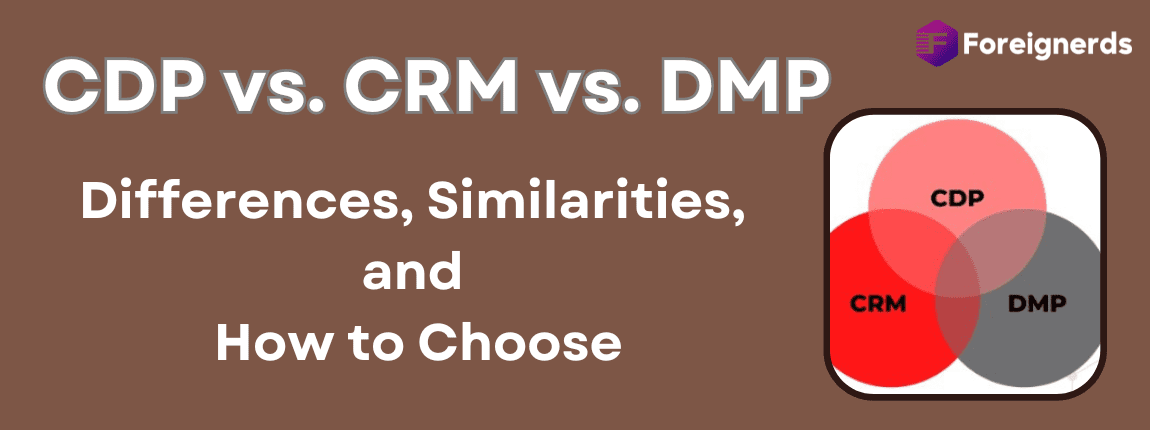- Home
- B2B Companies
- CDP vs. CRM vs. DMP —...

In the ever-evolving landscape of digital marketing and customer data management, acronyms like CDP, CRM, and DMP frequently appear. While these terms may seem interchangeable at first glance, they serve distinct purposes in the realm of customer data and relationship management. In this article, we’ll delve into the differences, similarities, and provide guidance on how to choose the right solution for your business needs.
Customer data encompasses a wealth of information gathered from interactions and transactions with customers. This data includes contact details, purchase history, preferences, and behavioral patterns. It is the lifeblood of modern marketing, enabling businesses to understand and engage with their audience better.
In today’s competitive market, businesses that harness customer data effectively gain a significant advantage. It allows for personalized marketing, improved customer service, and data-driven decision-making, ultimately leading to increased customer satisfaction and loyalty.
A Customer Data Platform is a specialized software that centralizes and unifies customer data from various sources, both online and offline, into a single, comprehensive profile. It provides a 360-degree view of each customer, allowing businesses to create highly personalized marketing campaigns.
CDPs excel in data integration, segmentation, and real-time updates. They enable marketers to segment their audience based on specific criteria and trigger automated marketing actions, making them invaluable for targeted marketing efforts.
A Customer Relationship Management system focuses on managing interactions and relationships with existing and potential customers. It typically includes features for contact management, lead tracking, and sales automation.
CRMs are instrumental in managing sales processes, customer support, and maintaining a historical record of customer interactions. They enhance customer relationships by streamlining communication and ensuring follow-ups.
A Data Management Platform is designed for managing and optimizing audience data, primarily for advertising and targeting purposes. DMPs collect and organize data to help businesses make informed decisions regarding their advertising campaigns.
DMPs are essential for businesses looking to improve ad targeting and ROI. They centralize data from various sources to create comprehensive audience profiles, aiding in more effective advertising strategies.
CDPs primarily focus on customer data centralization and personalization, while CRMs concentrate on customer interactions and relationship management. DMPs, on the other hand, emphasize audience data for advertising and targeting.
CDPs are ideal for marketing teams aiming to deliver personalized experiences, CRMs excel in sales and customer service, and DMPs are crucial for optimizing advertising efforts.
CDPs gather data from various sources, including online and offline interactions, while CRMs focus on contact and interaction data. DMPs predominantly collect data related to online audience behavior.
All three platforms collect and manage data. CDPs gather comprehensive customer data, CRMs focus on customer interactions, and DMPs specialize in online audience data.
CDPs and CRMs both support personalization, allowing businesses to tailor their marketing and customer interactions. DMPs indirectly contribute by providing insights for more targeted advertising.
To select the appropriate platform, evaluate your business’s primary goals. If personalization and unified customer profiles are essential, a CDP may be the best choice. For sales and customer relationship management, a CRM is ideal, while DMPs are vital for advertising optimization.
Consider your budget and the cost of implementation and maintenance. CDPs tend to be costlier due to their advanced data integration capabilities, while CRMs and DMPs offer more budget-friendly options.
Evaluate your future needs for scalability. Ensure that your chosen platform can grow with your business.
Proper integration and training are crucial for maximizing the benefits of your chosen platform. Collaborate with your IT and marketing teams to ensure a seamless transition.
If you’re transitioning from an existing system, plan and execute data migration carefully to avoid data loss or inconsistencies.
Define KPIs that align with your platform’s purpose. Monitor and assess the impact of your chosen solution on your business objectives.
Continuously adapt and optimize your chosen platform to stay ahead in the dynamic world of customer data management.
In the digital age, CDPs, CRMs, and DMPs are powerful tools for managing customer data and relationships. Understanding their differences and similarities is crucial to making an informed choice that aligns with your business goals. Selecting the right solution will empower your organization to thrive in the competitive landscape of customer-centric marketing.
Choosing the right platform among CDPs, CRMs, and DMPs requires careful consideration of your business needs, budget, and scalability requirements. Each of these solutions has a distinct role in the realm of customer data management, and by selecting the one that aligns with your goals, you can propel your business towards greater success in the digital era.
© 2013 - 2025 Foreignerds. All Rights Reserved